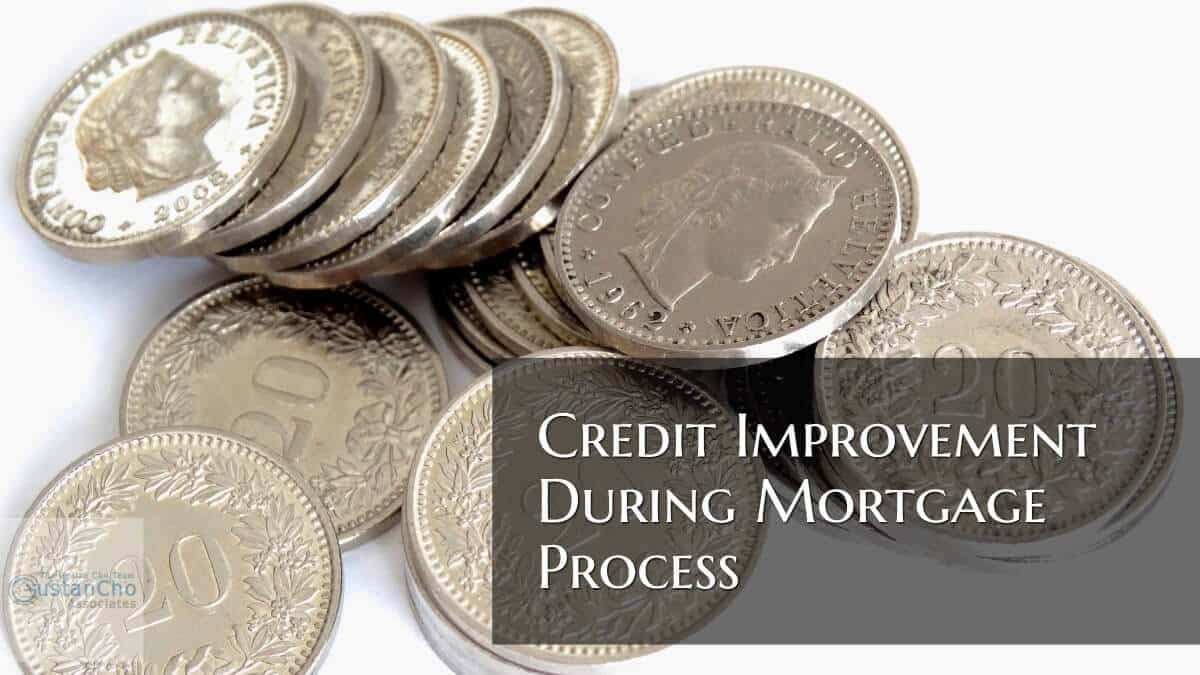Credit Improvement During Mortgage Process To Qualify For Mortgage
This BLOG On Credit Improvement During Mortgage Process To Qualify For Mortgage Was UPDATED On April 30th, 2025.
Your credit score is one of the most important factors when qualifying for a mortgage. It determines whether you get approved, the interest rate, loan program eligibility, and even down payment requirements. But what if your credit score isn’t quite where it needs to be when you apply or it drops during the process? Don’t worry. There are strategies you can use to do credit improvement during mortgage process. In some cases, it could make the difference between denial and approval or save you thousands over the life of your loan.
Why Credit Scores Matter in the Mortgage Process?
Lenders evaluate your credit score to judge your financial trustworthiness. Here’s how it affects your mortgage:
- Loan approval: Most conventional loans require a minimum score of 620; FHA loans allow scores as low as 500 with 10% down.
- Interest rates: Higher credit scores qualify for better rates. Even a 20–40 point increase could reduce your monthly payment.
- Loan options: Certain programs (like conventional or jumbo loans) have stricter credit requirements.
- PMI costs: With a conventional loan, a better credit score can lower your private mortgage insurance premiums.
Looking to Improve Your Credit to Qualify for a Mortgage?
Credit improvement can be the key to securing the best mortgage rates and terms. Contact us today for expert advice on how to boost your credit during the mortgage process.
Is Credit Improvement During Mortgage Process Possible?
Yes, credit improvement during mortgage process is possible but timing and strategy are everything. Once your application is submitted, lenders usually pull your credit at least twice. Initial credit pull at pre-approval or application, and final credit check right before closing (a soft pull). Suppose your credit score improves in the meantime, in that case, some lenders may allow a “rescore” (also known as a Rapid Rescore) to help you qualify for a better rate or program. However, specific actions can hurt your credit and jeopardize your loan approval, so be careful.
Advice On How To Tackle Credit Improvement During Mortgage Process
Credit improvement during mortgage process should be done prior to the mortgage loan application. Here are a few reasons why. One of the reason is because lenders will use the credit scores and credit report initially submitted with the mortgage loan application. Whether credit scores increases or decreases, it has no bearing in the mortgage process. Another one is because credit scores fluctuate month after month. If credit scores have drastically gone up during the mortgage process, we can use the higher credit scores for pricing. Lastly, it does take time to work on credit improvement.
Steps to Do Credit Improvement During the Mortgage Process
Here are smart and safe actions to do credit improvement during mortgage process.
Pay Down Revolving Balances
The credit utilization ratio or the amount you owe versus your credit limits makes up about 30% of your FICO score. Keep your usage under 30% of each card’s limit. Ideally, keep it under 10% for the best score gains. Focus on paying down balances, not just making minimum payments. For example, if you have a credit card with a $1,000 limit and a $700 balance, paying it down to $100 could improve your score within a week.
Don’t Miss Any Payments
35% of your credit score are made up from your payment history. Even one late payment can cause 50 to 100 points drop. It can negatively impact your credit improvement during mortgage process. Set up auto-pay or payment reminders. Ensure all your bills especially credit cards, student loans, and car payments are made on time. If you’ve recently missed a payment, call the creditor and ask for a goodwill adjustment.
Avoid Opening New Credit
Applying for new credit cards, loans, or store accounts during the mortgage process can trigger a hard inquiry, which may lower your score, increase your debt-to-income ratio (DTI), and raise red flags to underwriters. Tip: Avoid financing furniture, cars, or new lines of credit until your loan has closed. This can do a lot with credit improvement during mortgage process.
Dispute Errors on Your Credit Report
Incorrect information like late payments you didn’t make or accounts that don’t belong to you can hurt your score. Request copies of your reports from Equifax, Experian, and TransUnion. If the error affects your mortgage approval, use each bureau’s dispute process or work with your lender to initiate a Rapid Rescore.
Ask Your Lender About Rapid Rescore
A Rapid Rescore is a service allowing your lender to submit updated account information to the credit bureaus and recalculate your score in 3–7 business days. You’ll need proof of account changes (like a paid-off balance), and the process can only be initiated by your mortgage lender not by you directly.
Keep Old Credit Accounts Open
The length of your credit history impacts about 15% of your score. Do not close old credit cards, even if you don’t use them. Keeping them open helps maintain your average account age and total credit available. It helps with credit improvement during mortgage process.
Avoid Large, Unverified Bank Deposits
If you deposit large amounts of cash into your bank account without a paper trail, it can raise concerns during underwriting and delay your mortgage. If you’re doing credit improvement during mortgage process and also saving for closing costs keep all money documented, avoid cash deposits, and use direct transfers or payroll deposits.
Credit Scores And Credit Report Prior To Applying For Mortgage

Many borrowers think that just because they meet the minimum credit score requirements to qualify for mortgage that they will automatically meet the credit requirements to qualify for a mortgage. This is not always the case. Credit scores are important. It is a piece of the overall credit requirements to qualify for home loans. Credit tradelines are viewed and taken into consideration by mortgage underwriters:
- Just because consumers open a secured credit card with a $500 credit limit does not mean they have credit tradelines
- A credit tradeline is a credit account that has been seasoned for at least one year and preferably two or more years:
- Late payments in the past 12 months are considered serious and credit risks
- Most lenders do not want to see any late payments in the past 12 months
- Can only have one 30-day mortgage late payment in the past 12 months
- Multiple 30-day late payments will disqualify borrowers from qualifying
- Late payments after bankruptcy, deed in lieu of foreclosure, foreclosure, and short sale can be deal killers
- Most lenders will not accept any borrowers with late payments after bankruptcies and/or foreclosures
- Credit disputes on non-medical outstanding collections and charge off accounts are not permitted during the mortgage process
- Maxed out credit cards can plummet a borrower’s credit scores
It is best that borrowers pay down their credit card balances prior to applying for a home loan.
Need to Improve Your Credit to Secure a Mortgage?
We can help guide you through the steps to raise your credit score during the mortgage process. Contact us today to learn how we can help you qualify for your dream home.
What NOT to Do During the Mortgage Process
Even with the best intentions, these mistakes can lower your score or get your mortgage denied. Opening or co-signing for new credit. Closing credit accounts. Missing a payment by even one day. Increasing credit card balances. Changing jobs or quitting without notifying your lender. Making undocumented large deposits.
How Much Can Your Credit Score Improve Before Closing?
Small changes can have a big impact with your credit improvement during mortgage process. Paying down credit cards can improve 20 to 60 points. Correcting an error can do +10 to 100+ points. Reducing utilization under 10% could have +10 to 40 points. If your credit score improves enough, you might qualify for a better interest rate, a lower mortgage insurance premium, and a different loan type (FHA to Conventional, for example)
VA And FHA Chapter 13 Bankruptcy Lending Guidelines
There is no waiting period to qualify for VA and FHA Loans after a Chapter 13 Bankruptcy discharged date. Borrowers can qualify for VA and FHA Loans one year into a Chapter 13 Bankruptcy repayment plan. Need approval of the Chapter 13 Bankruptcy Trustee. There is a two-year waiting period to qualify for a Conventional Loan after a Chapter 13 Bankruptcy discharged date. 4 year waiting period after Chapter 13 dismissal date on Conventional Loans. There is no waiting period to qualify for VA and FHA Loans after a Chapter 13 Bankruptcy dismissal date.
Frequently Asked Questions: Credit Improvement During Mortgage Process
1. Can I do credit improvement during mortgage process?
Yes! you can do credit improvement during mortgage process. In many cases, you can take specific steps like paying down credit card balances or correcting errors that may boost your score before closing, especially if your lender can do a Rapid Rescore.
2. What is a Rapid Rescore?
A Rapid Rescore is a service mortgage lenders use to quickly update your credit report with new information (like a paid-off account). It can raise your score in as little as 3–7 business days, helping you qualify for better rates or approval.
3. Will my credit be checked more than once during the mortgage process?
Yes. Most lenders check your credit at the beginning of the application process and again before closing to ensure no major changes have occurred. That’s why it’s important to maintain or improve your credit throughout the entire process.
4. What should I avoid while my mortgage is being processed?
Avoid opening new credit accounts, missing payments, making large purchases on credit, taking on new debt, and co-signing for loans. These actions can lower your score or disqualify you.
5. What’s the fastest way to improve my credit score during underwriting?
The quickest strategies to do credit improvement during mortgage process include paying down credit card balances, removing errors or outdated negative items, and requesting a Rapid Rescore through your lender. Even small changes can have a big impact if timed correctly.
6. How much can my score go up before closing?
It depends on your situation, but many borrowers see 10–60 point increases by lowering credit utilization or fixing errors. These gains can improve your loan terms or move you into a better loan program.
7. What if my credit score drops during the mortgage process?
If your score drops significantly, it could affect your loan approval, interest rate, or program eligibility. Always talk to your loan officer before making financial changes while under contract.
8. Does checking my own credit hurt my score?
No. Checking your credit through consumer sites or credit monitoring tools results in a soft inquiry, which does not affect your score. It does not affect your credit improvement during mortgage process.
9. Can I still qualify with a low credit score?
Yes. FHA and VA loans give more flexibility, and non-QM loan options are available for borrowers with recent credit challenges. A mortgage expert can help you find the best path based on your current score.
10. Is it better to wait and improve my credit or move forward now?
It depends on how close you are to qualifying and your homebuying timeline. If a small improvement could significantly lower your rate or fees, it may be worth a short delay. Your loan officer can help you decide and do credit improvement during mortgage process.
You Can Improve Your Credit While Getting a Mortgage
Credit improvement during mortgage process is not only possible but can also make a real difference in whether you qualify and what you pay. With discipline, awareness, and support from the right lender, you can move closer to approval and even save thousands over the life of your loan.
At Gustan Cho Associates, we specialize in helping borrowers with low credit scores, recent financial issues, or unconventional income qualify for home loans. There are no lender overlays, manual underwriting, FHA, VA, Non-QM, and Bank Statement Loans, and rapid Rescore support. Still has questions about credit improvement during mortgage process or ready to qualify for the best mortgage possible? Apply now or schedule a free credit consultation today.
Improve Your Credit and Get Closer to Your Mortgage Approval
If you’re working to improve your credit to qualify for a mortgage, we’re here to help. Reach out now to learn how we can assist you in boosting your score and getting you approved.






